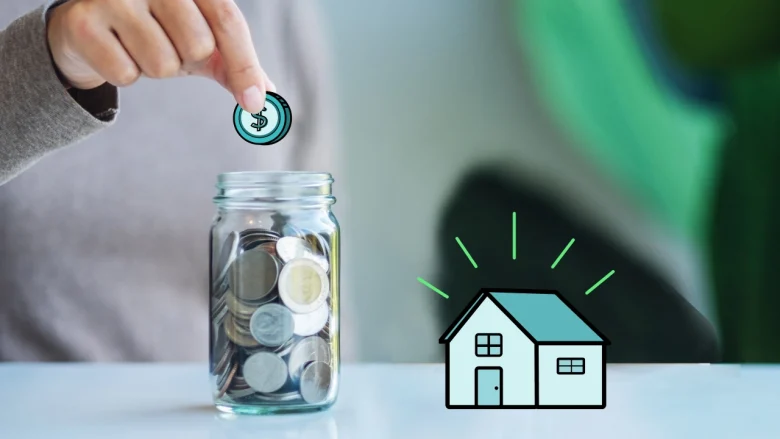Dreaming of owning your own home? You’ve got company. Many people believe that buying a home is the pinnacle of success: a place that reflects your personality and provides stability for years to come. Before you can make your dreams come true, you need to save enough money for a down payment.
Raising the money for your first investment can be daunting. As a result, buying a home can seem overwhelming. However, smart tips and realistic planning can help you reach your down payment goal faster. Let’s discuss how to turn your dreams into keys so you can start creating memories in your new home today!
Why Homeownership Is a Smart Move
Buying a home isn’t just about buying real estate; it’s also about investing in your future. Property values often rise faster than inflation, providing financial security. Unlike renters, homeowners gain equity with every mortgage payment they make. This equity can help protect or finance future investments.
Homeowners have tax benefits that renters don’t. Property taxes and mortgage interest deductions can help reduce financial stress. In an unpredictable market, owning a home can provide stability. Owning a home protects you from fluctuations in rent that can strain your budget. Creating your own space not only provides financial benefits but also fosters a sense of community and personal fulfillment. Investing in real estate is smart, intelligent, and can completely transform your budget and lifestyle.
Your Current Financial Analysis
Before you begin a home savings plan, you need to assess your financial situation. This phase is crucial for financial awareness. Make a list of all your sources of income. Think income, side hustles, and investments. The foundation of any savings strategy is understanding your monthly income.
Expenses for the next number. Divide your expenses into fixed and variable expenses, such as rent, utilities, groceries, and entertainment. Spending patterns can provide opportunities for savings. Keep in mind that debts such as credit card debt, student loans, and car debt can reduce your savings. Clearly display your debts and income. This financial overview will shape your future decisions. Understanding this data will help you make smart savings decisions.
Create a Realistic Budget
A budget is essential for making a down payment. First, calculate your monthly income and expenses. Make a list of all your expenses, from rent to groceries, and eliminate unnecessary expenses. Then, set a savings goal. Determine your down payment and timeline for purchasing your home. This will help you calculate your monthly savings.
Try using a budgeting app or spreadsheet to track your progress. Knowing where your money is going can help you stay on track. Factor in unforeseen expenses, like car repairs and medical bills, in your budget. Even temporary lifestyle changes can add up to savings. Small sacrifices you make now can pay off big later in the homebuying process.
More Money-saving Tips
Automate your deposits to save more. Schedule a direct deposit of your paycheck from your checking account to a high-yield savings account. Here’s how to save without even thinking about it. The next step is to cut back on unnecessary expenses. Check and cancel unnecessary subscriptions and memberships. Small savings can quickly add up.
The 50/30/20 rule also works. Spend 50% of your income on necessities, 30% on wants, and 20% on savings or paying off debt. Adjusting this balance can help shift the emphasis to savings. Explore part-time and freelance work to increase your income. Even a part-time job can increase your down payment on the purchase price.
Alternative Down Payment Financing Methods
Many potential homeowners overlook creative down payment financing options. Access to personal assets can change everything. Consider liquidating investments or selling things you no longer need. Some people use crowdsourcing platforms to buy homes. This innovative approach involves friends and family in your goals, creating a community effort.
Another option is to use family gifts. Talk to families who support you about using gift money as a down payment. Many lenders accept them. First-time homebuyers can get grants or low-interest loans from state and local programs. Researching these sources can provide opportunities for personalization. Some companies offer homebuyer benefits as an employee incentive. Ask about programs that can help you become a homeowner.
The Importance of a Good Credit and Improvement
Saving money for a home requires good credit. It directly affects mortgage rates and terms. Good credit can save you thousands of dollars over the life of your loan. Start improving your credit by understanding your credit score. Check your credit report for incorrect or outdated information that can lower your score. Report errors immediately.
It is critical that you pay your bills on time. With reminders or automatic payments, you can avoid late fees that can lower your score. Debt reduction can also improve your credit score. Credit card debt should be reduced. Avoid opening additional lines of credit before applying for a mortgage, as each application can lower your score and make you less favorable when buying a home.
Conclusion
Saving for a home is essential. It takes hard work and strategy. Everyone has a different home-buying path. Understand your financial situation to maximize your options. Creating a budget that fits your lifestyle can make saving easier. The right technology can help you process your down payment faster.
Consider unusual resources such as grants or assistance. You may be surprised by the products and services they offer. Maintaining good credit is also important. A good credit score can help you get your loan approved faster and pay a higher interest rate. Focusing on the final stages of the race can help you overcome obstacles. Every step toward your ideal home is worth it.
FAQs
1. What is a typical down payment?
The down payment is typically 20% of the home price. However, some loan programs offer a 3% down payment or no down payment at all.
2. How long does it typically take to save money for a down payment?
The timing depends on your savings rate and goals. Some people took two years to save; others took five years.
3. Can first-time homebuyers get a special loan?
First-time homebuyers can get special mortgages from several lenders. These loans typically have lower interest rates and down payments.
4. Can I use a gift as a down payment?
Absolutely! Many lenders will accept home gifts as a down payment. Document these gifts according to the lender’s standards.
5. What if I have bad credit? Can I still buy a home?
It’s tough, but it’s doable. Good credit improves your borrowing options, but there are also programs for people with bad credit.




